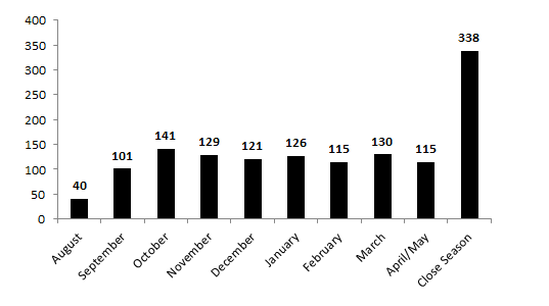It’s a tough time for Arsène Wenger. Arsenal are performing poorly relative to their expectations in the English Premier League and there has been two notable unsavoury interactions between Wenger and the Arsenal fans. The first was the rather callous but profound banner – “Arsène thanks for the memories but it’s time to say goodbye” held aloft at the Emirates. Then there was the viler dealings that Wenger had with Arsenal fans as he boarded a train following a defeat at Stoke. Footage of Arsenal fans heckling the manager at the platform can be viewed here. Wenger, on the other hand, has told his critics to judge him at the end of the season.
What does the data say in regards to making it through the season unscathed as a manager in English football?
In the updated Handbook on the Economics of Professional Football released last month Professor John Goddard, someone whom has written extensively about the economics of football, has a chapter that analyses the patterns of managerial change in the English Football League from 1972 to 2013. His dataset covers 1804 managerial spells. An interesting table in his chapter details the month in which ‘involuntary’ managerial departures occurred. These involuntary departures are defined as dismissals that were instigated by a football club (the traditional sacking!) and also include managerial resignations that were fuelled by no obvious reasons other than poor results. Below is Professor Goddard’s data presented in a graphical format and shows the variation in these dismissals by month*.
Taking account of both voluntary and involuntary managerial change Goddard notes that October, after approximately a quarter of the season, is the peak month for within season managerial change in English football. For this season the 7th to 9th round of fixtures were played in October. For me, this reaffirms that the start of a season is the most important period for a manager.
As we are now in December this is perhaps good news for EPL managers who have avoided the axe. Alternatively Mr.Wenger's call to judge him at the end of the season may not necessarily be a good thing either, unless results improve; after all 25% involuntary departures have occurred during the off season.
The data for this chart was taken from Chapter 16 - The Football Manager, by John Goddard that is in the 2014 edition of the Handbook on the Economics of Professional Football,

 RSS Feed
RSS Feed